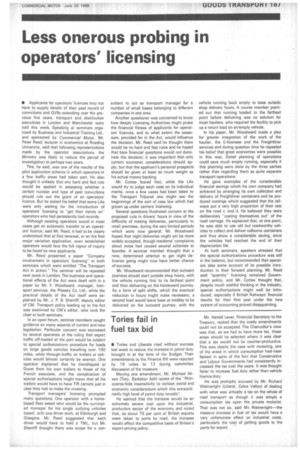Tories fail in fuel tax bid
Page 189

If you've noticed an error in this article please click here to report it so we can fix it.
• Tories and Liberals tried without success last week to reduce the increase in petrol duty brought in at the time of the Budget. Their amendments to the Finance Bill were rejected by 16 votes to 13 during committee discussion of the measure.
Moving one amendment, Mr. Michael Alison (Toni, Barkston Ash) spoke of the "Rhinoceros-hide insensitivity to various social and economic considerations which this extraordinarily high level of petrol duty reveals''.
He warned that the increase would be an extremely severe cost upon the industrial, productive sector of the economy and noted that, as about 75 per cent of British exports were taken to ports by road, the increase would affect the competitive basis of Britain's export-pricing policy. Mr. Harold Lever. Financial Secretary to the Treasury, replied that the costly amendments could not be accepted. The Chancellor's view was that, as we had to have more tax, those areas should be selected where it was clear that a tax would not be counter-productive, This was clearly the case with motoring, one of the areas in which consumption hadrisen fastest in spite of the fact that Conservative and Labour Governments had consistently increased the tax over the years. It was thought fairer to increase fuel duty rather than vehicle licence duty.
He was promptly accused by Mr. Richard Wainwright (Liberal, Colne Valley) of dealing with what was virtually a tax on the whole of road transport as though it was simply a consumption tax upon the private motorist. That was not so, said Mr. Wainwright—the massive increase in fuel oil tax would have a very unfortunate effect on industrial costs, particularly the cost of getting goods to the ports for export.










































































































































































































































































